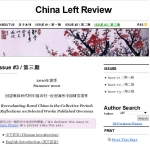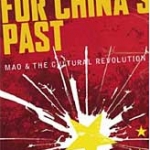Articles tagged with: cultural revolution
China Left Review, Chinese Revolutionary History, CSG Announcements »

Issue #3 of China Study Group’s bi-lingual web-journal China Left Review is focused on new essays, by Chinese and overseas writers, revisiting several English-language books about rural China during the collective/ “people’s commune” era (ca. 1957-1982). The issue also includes an article on China’s ongoing land-tenure debate, and one on Sino-Korean relations. With the exception of the latter article, every text is presented in both Chinese and English versions - a first for this journal which we hope to continue. (If you’d like to help out with translating, revising or writing for future issues, please contact [email protected].) Also note the new design of the CLR website, including the painting “Iron Bones Giving Birth to Spring” (铁骨生春).
Chinese Revolutionary History, Cultural Revolution, LangYan, Mao Zedong »
Links to two papers that were written in relation to the June 2006 Hong Kong conference on the 40th Anniversary of the Cultural Revolution: “Evaluating the Cultural Revolution in China and its Legacy for the Future” and “Chinese Foreign Policy during the Maoist Era and its Lessons for Today.”
China Studies, Chinese Revolutionary History, Cultural Revolution, Mao Zedong »

As China embraces capitalism, the Mao era is being surgically denigrated by the Chinese political and intellectual elite. This book tackles the extremely negative depiction of China under Mao in recent publications and argues most people in China, including the rural poor and the urban working class, actually benefited from Mao’s policy of a comprehensive welfare system for the urban and basic health and education provision for the rural, which is being reversed in the current rush towards capitalism.
China Studies, Cultural Revolution, International Observer »
Introduction: This issue represent the first collection devoted specifically to the Asian Sixties. In the U.S. and Europe, of course, what we might properly term the “Western Sixties” are known simply as “the Sixties.” Despite the worldwide salience of the war in Vietnam and of the Chinese Cultural Revolution in any consideration of the sixties as a global phenomenon, in much of the world the Sixties are still imagined as a western event- many would nominate Paris or Berkeley as the Capital of the World Sixties. Part of the impetus behind this collection was to remedy that perception, to suggest the centrality of Asia in any general consideration of the sixties, and to put the Asian sixties on the imaginative map.

